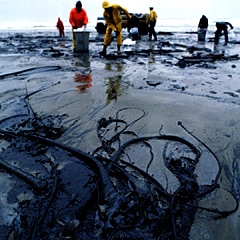There are few terms in the Canadian vernacular that irk me more than “ethical oil”. Since Ezra Levant’s 2010 book “Ethical Oil” hit the scene, it’s become the favourite language for government newspeak, and the media. Worst of all, its given tar sands proponents and the Conservative Government fodder for their debunked argument that tarsands oil is good for us.
Levant’s book looks at the ethical cost of our addiction to oil, and argues that Alberta tar sands oil is more ethically responsible than oil imported from despotic regimes in the Sudan, Russia, and Mexico, where human rights issues are of concern.
Though neither Harper nor our new Minister of Environmental Destruction have read the book, the term was exactly what the Conservatives needed to bolster the much-maligned tar sands. Prior to the echochamber that ensued after the publication of Levant’s book, tar sands oil was often characterized as “dirty” and “controversial” – much to the ire of the government.
Levant may well have learned the art of spin early in his career while spending the summer in an internship arranged by the libertarian and clean energy/climate change enemy Charles G. Koch Foundation, or through his work with the Fraser Institute. Levant himself coined the term “ethical oil” in 2009 after being involved in a panel on tar sands oil. The spin doctor finished the 90-minute debate having not managed to convince his audience of the merits of the toxic oil. Without admitting defeat, Levant quickly realized that he was going to have to find a different way to spin the dirty oil apart from economic arguments which just weren’t resonating with people.
And spin he did. Levant calls his catchphrase a “debate changer”. I would go further, and call it a debate stopper. Deploying the terminology of ethics in this controversial environmental issue evokes an emotional response in people. It makes people forget about the environmental impacts and devastation it has caused in various communities, and shifts focus to despotic regimes in other countries. It’s a powerful tool, because psychologically, people forget the environmental considerations when this type of argument is employed. Certainly these despotic regimes are of concern, but they are, frankly, beside the point. This is why Levant’s terminology is so dangerous.
Sure, Canadians love to be considered ethical – historically we have been peacemakers, peacekeepers, and have been generally well-perceived in the world. The stain on our reputation of late has consistently been due to the controversy over Alberta’s tar sands. In hijacking the debate and reframing it in ‘ethical’ terms, Levant has enabled our government to shirk the environmental embarrassment at Copenhagen and Cancun, and evade responsibility to take measures to halt climate change and invest in a clean energy future.
And that is exactly why we must stop calling tar sands oil “ethical oil”.
Tar sands oil is not ethical. The acid content of tar sands oil is 15 to 20 times higher than typical oil products, and contains 5 to 10 times as much sulphur. In Northern Communities and First Nations communities, residents have begun to see the health impacts of tar sands oil, and are witnessing that the tar sands are having an irreversible impact on their culture.
You can no more argue the tar sands are ethical to First Nations communities than you can to the people of Michigan, ravaged by the Michigan Kalamazoo spill. The 400,000 watershed residents across 19 cities, 11 villages and 107 townships are still dealing with the after-effects of the spill. It’s estimated that roughly 1 million litres of oil have yet to be cleaned up from the environment.
Perhaps we “don’t kill gays” or “stone women to death” as Levant emotionally argues. And so we’re not buying (as much) oil from Saudi Arabia or Iraq where there are human rights abuses. That’s beside the point. Gitz Crazyboy, a member of the Blackfoot/Dene First Nation vehemently disagrees that tar sands oil is ethical. For him, the environmental impacts of dirty oil are damaging his people’s health, and are causing cancers and even death.
Calling the oil “ethical” is damaging to the debate because it shuts off debate. It creates a space where those who argue against tar sands oil are unethical, or hate freedom and democracy. Reframing the debate in this way fails to get at the true crux of the problem: we have a dirty oil addiction, and the oil industry is inadequately regulated to the detriment of people’s health. Alberta’s “Ethical oil” fails to get us out of this paradigm. It’s still oil at the end of the day, and dirty oil at that.
Ezra, I think it’s time we dropped the “ethical oil” language. For everyone’s sake.
Subscribe to our newsletter
Stay up to date with DeSmog news and alerts







